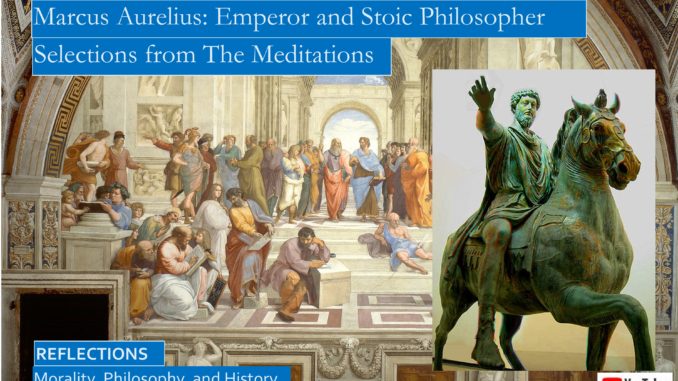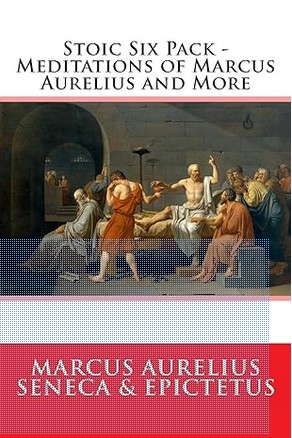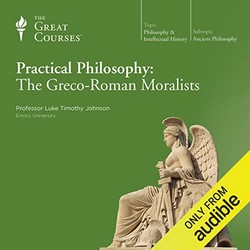
The Stoics and St Paul both share the fondness for lists of virtues and vices. The Meditations admonish, “Remember whenever you are vexed,” when you face life’s frustrations, “to apply this principle, that your trials are not misfortunes, but that to nobly bear what life throws at you is good fortune.”[1] Perhaps it would be better to pray that we may be able to endure suffering rather than that we avoid suffering, for sometimes suffering comes from our own faults or sins, or from the faults of sins of others, or our parents, or sometimes our sufferings just seem to happen without rhyme or reason, totally randomly.
Marcus Aurelius Blog 1 http://www.seekingvirtueandwisdom.com/marcus-aurelius-blog-1-friend-or-foe-or-both-of-christianity/
Stoicism and Saturday Morning and Monday Morning
Marcus Aurelius had no patience for neither Saturday mornings, nor for Monday mornings. “In the morning, when you rise unwillingly, let this thought be present: I am rising to the work of a human being. Why then am I dissatisfied if I am going to that which I was brought into the world to do? Or have I been made to lie under the blankets and keep myself warm? But this is more pleasant.”
YouTube video: https://youtu.be/0qHpReZYhv4
(We now prefer the Waterfield translations.)
YouTube video for blogs 2-5: https://youtu.be/0qHpReZYhv4
YouTube script for more book links: https://www.slideshare.net/BruceStrom1/marcus-aurelius-and-his-meditations-stoic-view-of-life
The Meditations admonish us, Do not be lazy! But then he says sometimes it is necessary to rest, but not in excess. Do not rest or eat or drink more than is sufficient, “so you do not love yourself.” What does a good emperor advise us, and also his successors? “Show those qualities that are altogether in your power: sincerity, gravity, endurance of labor, aversion to pleasure, contentment with what you have and with a simple life, benevolence, frankness, no love of frills, freedom from trifling magnanimity.” Do not grumble, do not be stingy, do not flatter, do not try to please men or show off.
Like Seneca, Marcus Aurelius comments on those who keep scorecards on their friend’s friendship. He observes that some men, when they do their friend a favor, records it in his scorecard, other men count favors to friends as debts expecting repayment, while some men when they help others do not even know what they have done, but are like vines producing grapes seeking nothing more. Who is the best friend? Surprisingly, the answer is ambiguous, he says “it is characteristic of the social animal to perceive that he is working in a social manner, and to wish his friend should perceive it.” Maybe the message is we should even be perfect in moderation, that expecting appreciation from your friends can be admirable, that what matters is that our motives be pure, that only God know men’s hearts, so we should not keep a scorecard on who is keeping a scorecard on us. Be good, but be good in the right way, and don’t be too good.
Marcus Aurelius reminds us, “your habitual thoughts will determine the character of your mind, for the soul is dyed by your thoughts.” This echoes St. Paul’s admonishment in 1 Cor 10 5-6: “We destroy arguments and every proud obstacle to the knowledge of God, and take every thought captive to obey Christ, being ready to punish every disobedience, when your obedience is complete.”
St. Paul speaks of living a godly and Christian life in military terms, in always fighting the good fight of faith, and Marcus Aurelius tells us how we face adversity. Above all, he says that he “must do good to men and endure them. When they are obstacles to my proper acts, man becomes to me as indifferent as the sun or the wind or a wild beast.” They may block my actions, but they cannot block my disposition, because my mind converts and changes every hindrance into an aid, and every obstacle into an open gate.
How can you be happy? The stoics don’t talk about happiness that often, but Marcus Aurelius says “you can pass your life in an equable flow of happiness if you can follow the right way and think and act in the right way.” Who is equable? The dictionary says someone is equable when they are not easily disturbed or angered, and are calm and even-tempered. He continues, “two things are common both to the soul of God and to the soul of man: not to be hindered by another, and to seek the good in justice.”
So what will be our reward living a godly life? What will be fortune that we earn? Our reward, our “good fortune is a good disposition of the soul, good emotions, and good actions.”[2]
The Gospel exhorts us to love not only our friends but also our enemies, and to love even those who spitefully use us. Likewise, Marcus Aurelius observes, “it is peculiar to man to love even those who do wrong,” for the wrongdoers “are fellow humans who do wrong through ignorance, often unintentionally,” and like us they will also soon die. “Above all, the wrongdoer has done you no harm” for he cannot steal your virtue and goodness. Indeed, “it is your duty to pardon those who wrong you,” they may be mistaken, they may be deluded into thinking they have actually done what is right. “Confine yourself to the present.” “Think of your last hour. Let the wrong that is done by a man stay there where the wrong was done.”[3]
Bear no grudges. The wrong-doer wrongs himself, the unjust is unjust to himself, because the wrong-doer and unjust corrupt themselves. “When another blames you or hates you, or when men say anything injurious about you, approach their poor souls, penetrate within, and see what kind of men they are. You will discover that there is no reason to be concerned that these men have this or that opinion about you. You must, however, be welcoming to them, for they are your friends. And God, too, aid them in all ways, by dreams, by signs, toward the attainment of those things on which they set a value.” “If any man has done wrong, he harms himself. But perhaps he has not done wrong.”[4] We cannot see into men’s souls, only God knows our motivations, only God can truly judge.
These meditations make it easier for us to accept and welcome the final Beatitudes:
Blessed are those who are persecuted for righteousness’ sake, for theirs is the kingdom of heaven.
Blessed are you when men revile you and persecute you and utter all kinds of evil against you falsely on my account. Rejoice and be glad, for your reward is great in heaven, for so men persecuted the prophets who were before you.[5]
Marcus Aurelius Blog 4 http://www.seekingvirtueandwisdom.com/marcus-aurelius-blog-4-be-critical-of-yourself-be-gracious-towards-your-neighbor/
[1] Marcus Aurelius, “Meditations,” translated by George Long, revised and updated (Dover Publications, 1997), Book IV, 27.
[2] Marcus Aurelius, “Meditations,” Book V, 28-36.
[3] Marcus Aurelius, “Meditations,” Book VII, 47-50.
[4] Marcus Aurelius, “Meditations,” Book IX, 69-73.
[5] https://www.biblegateway.com/passage/?search=matthew+5%3A10-11&version=NRSVCE







8 Trackbacks / Pingbacks